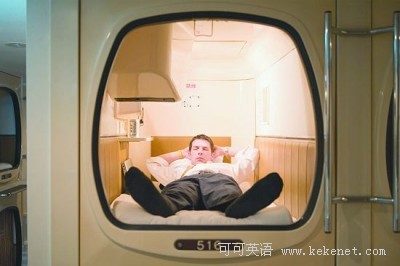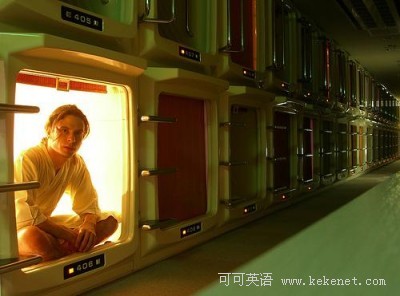日本地少人多,在東京等大城市更是寸土寸金,于是一種被稱為“膠囊”的旅館因價格便宜應(yīng)運而生,這種已有30多年歷史的居住方式受金融危機影響變得很火,日本大城市不少失業(yè)或面臨失業(yè)的人不得不住進這種只能爬進去的“蝸居”。不過,“膠囊”里面的生活設(shè)施還算齊備,甚至可以說很人性化,解決了不少“有家不回”或“無家可歸”者的燃眉之急。
Capsule hotels popular in Japan
Japan's capsule hotels appeared in 1979 with the purpose of providing a bed for those who work too late to catch the last bus. In past two years, they have became more popular as the economy was hit hard by the global financial crisis. Many people who lost their job have to live in these hotels.

Capsule Hotels fully epitomize Japan's passion for saving space. Inside the hotel there are many small rooms which look like washing machines. Every room, 2 meters long, 1 meter wide and 1.25 meters high, is called a capsule. It is equipped with one bed, one table and one TV set.
To save costs, the whole capsule hotel is serviced by one front desk clerk. No one will come to collect room fees or send water. Instead it is equipped with vending machines, electronic terminals and cameras.
A capsule hotel room only costs about 3500 yen for one night. That is half the cost of a normal hotel and 1 fifth of a big hotel. A one month fee is about 70 thousand yen. That is rather cheap in Japan.

Capsule hotels are convenient, cheap, comfortable, safe and clean, and they have been widely promoted in many big cities in southeast Asia and Europe. Currently, some hotels of this kind are showing up in Beijing, Shanghai and Hangzhou. During this era of skyrocketing house prices, capsule hotels may become a temporary choice for some people.











